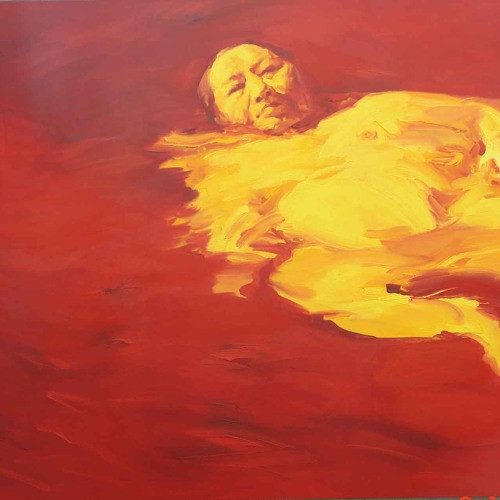Born in the P.R.C.

It is only for the sake of those without hope that hope is given to us.
— Walter Benjamin
On the wall hung four thrift shop records and an EZLN banner — all the worthy stuff the young yellow man had in his New York apartment.
In a drifting journey of twenty-one years, he lived his life as a commie in every possible way — even training his ears to be his unironic comrades.
In his carefree childhood, Reform and Opening Up was his mother’s government-issued coupon. His happiness was shopping with her in the state-run department store enjoying Kenny G’s R& B. Sometimes the radio host would play Boney M or ABBA, but he, unlike his boogie mother, was not very impressed.
In his melancholic adolescence, Socialist Patriotism was nothing compared to his father’s highway playlist. He recalled his most emotional moment riding in the back seat, listening to the Beatles. His father usually did nothing but finger-tapping, but he could already mouth several lines of Revolution following the beat.
In his young adulthood, he was not drawn to Xi-Jinping Thought in the slightest. He did not care much about his Youth League membership, but he went high every time his young, wacko comrades played Internationale or Bella Ciao to wrap up their weekly talkathon on the must-go group study sessions.
Looking back, everything felt subtly out of place. His mother, now a bureaucrat, must have been a “dancing queen” in her youth, while his father — despite never setting foot in America — could be a hippie. He couldn’t quite tell when or why they had become different people, but their music reminded him who they used to be.
Their secret intrigued him, and he would not let go of a chance to get them talking. Sometimes they said they could not remember; other times, they just told him there was nothing worth knowing. Again and again, they stubbornly withheld their past from him. He was shut out — and he resented it.
“You were born here, in China — you shall never forget this, ” said his father. “We did everything we could to let you become whoever you wanted to be, ” his mother added. He nodded, he turned around, and he walked into the airport security — no hugs, no take care, no tears. The truth was, he didn’t dare look back, fearing it would lower his guard toward them. He thought he already knew the secret they wouldn’t let him know. He resented their compliance, their numbness, and their pathetic excuses. He heard Radiohead sing “but don’t look back in anger” in headphones — but he refused to take the advice.
Entering college, he grew less angry and less outspoken, spending more time on Chaucer rather than civil disobedience. To avoid derailing daily conversations with his usual commie harangues, he chose to set politics aside — Spotify quietly took over as he tucked his French Theories away in the wardrobe. Much like how emerging nations strive to catch up with the developed world, he now found himself trying to keep pace with his sweetheart’s taste — first for the British Invasions, then Shoegaze, and now Clairo, whom he later realized was the YouTube prodigy he had been loosely following since junior high.
At times, he felt as if the memories of China would never come back to get him.
He didn’t support the encampment on his campus — it wasn’t his ideology.
He didn’t say anything about the illegal arrests — it wasn’t his race.
He didn’t speak against the trans ban — it wasn’t his identity.
Among his angry peers, he felt like a stranger — yet somehow closer than ever to a life his parents had quietly feared for him. When people talked about reliving the ‘68 when the woke turned things upside down, he saw his parents’ back — red flags in their hands, peddling their bicycles down the one-way street into that burning night of June. The echo of Internationale and A Piece of Red Cloth finally didn’t survive that summer, and no one who lived through it came out unchanged. Decades later, his parents decided to release that unbearable weight. All the disillusionment and grief had settled into nostalgia — neatly sliced and sealed in the length of songs that occasionally slipped, unbidden, from the players.
The night had passed, and he slowly woke up in the early sunshine of Morningside Height. As always, the first thing he saw was the banner and the records on the wall. Born in the P.R.C., he had inherited an unfulfilled dream. He no longer resented his parents — their flags now rested in his hands, their chants still echoed in his mind.
6.4.2025
